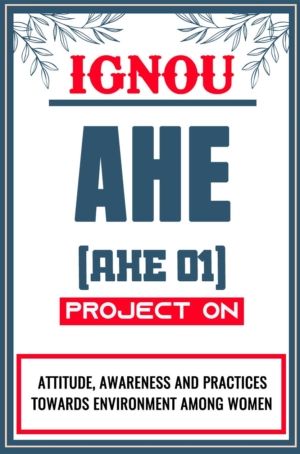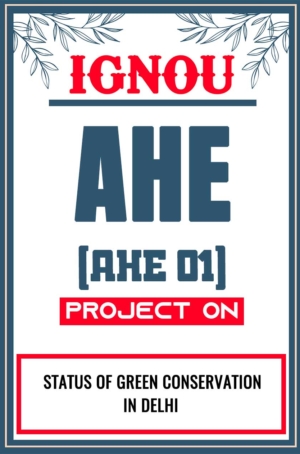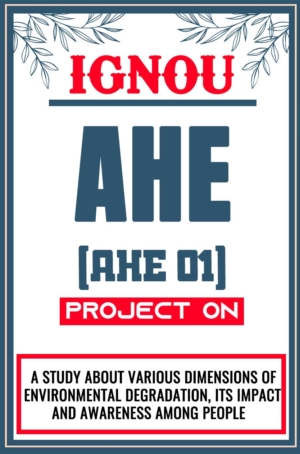Buy IGNOU AHE-01 Project Report & Synopsis – Human Environment (AHE) Ready-to-Submit, Supervisor-Friendly Format, Topic Selection, Proposal/Synopsis as per IGNOU
In AHE, we will study that the environment has the greatest impact on most of us nowadays. This IGNOU AHE 1 PROJECT is must be accomplished individually by every learner of AHE program. In this context, the IGNOU AHE PROJECT plays a crucial role in the learning process. So this IGNOU AHE 1 PROJECT can be considered as an inspiration for the learners because it allows them choose different methods and technics during its development.
The course IGNOU AHE 1 PROJECT GUIDE offers students an engaging introduction to the essential topics in AHE (Application Course in Human Environment). IGNOU AHE PROJECT is a research assignment, given to student which requires a larger amount of effort than is involved in a normal assignment; it requires students to undertake their own fact finding for IGNOU AHE SYNOPSIS and IGNOU AHE REPORT.
Whatsapp us to get the Personalized (Customized) IGNOU AHE Project Report and Synopsis
Download Link for IGNOU AHE Project (AHE 01 PDF)
How should you structure the IGNOU AHE Project report?
Structuring your project report effectively is crucial for clarity and impact. Here’s a recommended structure for your AHE Project:
1. Title Page
- Title of the Project
- Your Name
- Course Code and Title
- Project Guide’s Name
- Submission Date
- Institution Name
2. Abstract
- A brief summary of the project, including the objectives, methods, key findings, and conclusions. Typically 150-250 words.
3. Table of Contents
- A list of all sections and subsections with page numbers for easy navigation.
4. Introduction
- Background: Context and significance of the topic.
- Objectives: What the project aims to achieve.
- Research Questions/Hypotheses: Key questions or hypotheses guiding the research.
5. Literature Review
- Review of Existing Research: Summary of relevant studies and theories.
- Gap Identification: Areas where your project will contribute new insights or solutions.
6. Methodology
- Research Design: Outline of the research approach and methods used.
- Data Collection: Methods of data collection (e.g., surveys, interviews, fieldwork).
- Data Analysis: Techniques used to analyze the data.
- Ethical Considerations: Any ethical issues addressed during the research.
7. Findings
- Presentation of Results: Detailed presentation of the research findings, including tables, graphs, and charts.
- Interpretation: Brief interpretation of what the results indicate.
8. Discussion
- Analysis: In-depth analysis of the findings in relation to the research questions and literature review.
- Implications: How the findings impact the field of human environment studies and practical applications.
9. Conclusion
- Summary: Recap of key findings and their significance.
- Recommendations: Practical recommendations based on the findings.
- Future Research: Suggestions for further research on the topic.
10. References
- Citation List: All sources cited in the project, formatted according to the required citation style (e.g., APA, MLA).
11. Appendices
- Supplementary Materials: Additional materials such as raw data, questionnaires, interview transcripts, or any other relevant documents.
IGNOU AHE Project Topics for AHE-01
- Attitude, Awareness And Practices Towards Environment Among Women
- Living Environment Versus Health
- Status Of Green Conservation In Delhi
- A Study About Various Dimensions Of Environmental Degradation, Its Impact And Awareness Among People
- Local Environment In Agra
What research methods can be used for the IGNOU AHE Project?
For the AHE Project (AHE 01), you can use various research methods depending on the nature of your topic and objectives. Here are some commonly used research methods:
Literature Review
- Description: Reviewing existing research, theories, and case studies related to your topic.
- Purpose: To understand the current state of knowledge, identify gaps, and frame your research within the existing literature.
Surveys
- Description: Collecting data from a sample of individuals using structured questionnaires.
- Purpose: To gather quantitative data on opinions, behaviors, or characteristics relevant to your research.
Interviews
- Description: Conducting in-depth conversations with individuals or groups to gather qualitative data.
- Purpose: To obtain detailed insights and perspectives from experts, stakeholders, or affected individuals.
Case Studies
- Description: Analyzing specific instances or examples related to your topic in depth.
- Purpose: To explore and understand complex issues in real-world contexts, often providing detailed examples and evidence.
Fieldwork
- Description: Collecting data directly from the environment or setting related to your research topic.
- Purpose: To observe and document real-world conditions, interactions, or phenomena.
Observations
- Description: Systematically observing and recording behaviors, events, or conditions in a natural setting.
- Purpose: To gain an understanding of actual practices, behaviors, or conditions as they occur.
Experiments
- Description: Conducting controlled tests to examine the effects of specific variables.
- Purpose: To determine cause-and-effect relationships or test hypotheses in a controlled environment.
Secondary Data Analysis
- Description: Analyzing existing data collected by others (e.g., government reports, previous research).
- Purpose: To use previously collected data to answer your research questions or support your analysis.
Document Analysis
- Description: Analyzing existing documents such as reports, policies, or records related to your topic.
- Purpose: To gain insights from written records and official documentation.
Focus Groups
- Description: Facilitated discussions with a group of people to gather collective opinions and insights.
- Purpose: To explore attitudes, perceptions, and ideas through group interaction.
Comparative Analysis
- Description: Comparing two or more cases, datasets, or scenarios to identify similarities and differences.
- Purpose: To draw comparisons and understand variations or trends across different contexts.
Action Research
- Description: A participatory research method that involves working with stakeholders to address a problem and implement solutions.
- Purpose: To actively engage in problem-solving and apply research findings to real-world challenges.
How do you submit your IGNOU AHE Project?
Submitting your AHE Project (AHE 01) involves several steps to ensure that your work is properly reviewed and evaluated. Here’s a general guide on how to submit your project:
1. Review Submission Guidelines
- Check Official Guidelines: Review the specific submission guidelines provided by IGNOU for your project. These guidelines will detail the format, documentation, and any special instructions for submission.
2. Prepare Your Project Report
- Format: Ensure your project report follows the required format, including title page, abstract, table of contents, and all other sections.
- Binding: If a hard copy is required, get your report bound according to IGNOU’s specifications (e.g., spiral binding, hard cover).
3. Include Required Documents
- Project Report: The completed and finalized project report.
Submission Form: Complete any submission forms required by IGNOU.
- Acknowledgment Receipt: If applicable, include any acknowledgment receipt from the submission center or project guide.
4. Check for Any Additional Requirements
- Soft Copy: Some courses may require you to submit a soft copy of your project. Ensure that you follow the instructions for digital submission, such as email or online portal upload.
- Additional Documents: Include any additional documents or forms required, such as a declaration of originality or project completion form.
5. Submit Your Project
- Hard Copy Submission: Deliver your project report to the designated IGNOU study center or regional center. Verify the address and submission deadlines.
- Soft Copy Submission: Upload or email your soft copy to the specified online portal or email address, if required.
6. Obtain Confirmation
- Receipt: Ensure you receive a receipt or acknowledgment confirming the submission of your project. This may be a physical receipt or a digital confirmation email.
7. Follow Up
- Verify Submission: Confirm that your project has been received and is in the correct format. Check for any additional instructions or feedback from your project guide or submission center.
What is the role of the IGNOU AHE Project guide?
The project guide plays a crucial role in the completion and success of your AHE Project for AHE 01. Here’s an overview of their key responsibilities:
1. Topic Selection and Refinement
- Assistance in Choosing a Topic: Helps you select a relevant and feasible project topic based on your interests and academic requirements.
- Refinement: Provides guidance in refining and narrowing down your project topic to ensure it is manageable and aligned with course objectives.
2. Project Planning
- Guidance on Objectives and Scope: Assists in defining clear research objectives and the scope of the project.
- Methodology Advice: Advises on appropriate research methods, data collection techniques, and project design.
3. Research and Data Collection
- Support in Research Methods: Offers advice on how to conduct literature reviews, collect data, and apply research methods effectively.
- Ethical Considerations: Ensures that your research adheres to ethical standards and guidelines.
4. Draft Review and Feedback
- Reviewing Drafts: Provides feedback on drafts of your project report, including suggestions for improvement.
- Quality Assurance: Helps ensure that the report meets academic standards, including clarity, organization, and adherence to guidelines.
5. Problem-Solving
- Addressing Challenges: Assists in addressing any challenges or issues you encounter during the project, such as difficulties in data collection or analysis.
- Providing Solutions: Offers solutions and alternative approaches if you face obstacles or need adjustments in your project.
6. Finalizing the Report
- Final Review: Reviews the final version of your project report to ensure it is complete and meets all requirements.
- Approval: Provides the necessary approval or endorsement for submission, if required by the institution.
7. Motivation and Support
- Encouragement: Provides motivation and encouragement throughout the project to help you stay focused and on track.
- Expert Advice: Shares expertise and insights to enhance the quality and relevance of your project.
8. Administrative Assistance
- Submission Guidance: Offers guidance on the submission process, including any required forms or documentation.
- Deadline Management: Helps you adhere to submission deadlines and project milestones.
What is the expected outcome of the IGNOU AHE Project?
The expected outcome of the IGNOU AHE Project for AHE 01 is to demonstrate your ability to apply theoretical knowledge from human environment studies to practical, real-world scenarios. Here’s a detailed look at what is expected:
Comprehensive Understanding
- Application of Knowledge: Show a thorough understanding of human environment concepts and theories and their application to the chosen project topic.
- Integration of Theory and Practice: Effectively integrate theoretical frameworks with practical observations and findings.
Research and Analysis
- Thorough Research: Conduct detailed and methodical research, including literature review, data collection, and analysis.
- Critical Analysis: Analyze and interpret research findings critically, linking them back to the theoretical concepts studied.
Practical Solutions or Recommendations
- Real-World Solutions: Develop practical solutions or recommendations based on your research findings.
- Implementation Feasibility: Ensure that the proposed solutions are realistic and feasible for implementation in the real world.
Well-Structured Report
- Clear Presentation: Present your research and findings in a well-organized and clear manner, following academic guidelines.
- Effective Communication: Communicate your ideas and results effectively through your report, making it accessible and comprehensible to readers.
Contribution to Field
- Original Insights: Provide new insights or contributions to the field of human environment studies.
- Identification of Gaps: Address gaps in existing knowledge and suggest areas for further research or exploration.
Academic Rigor
- Adherence to Guidelines: Ensure that the project meets academic standards and guidelines set by IGNOU, including proper citation and referencing.
- Ethical Considerations: Conduct research ethically, with proper attention to confidentiality, consent, and data integrity.
Practical Impact
- Addressing Issues: Address relevant environmental issues or challenges effectively through your project.
- Beneficial Outcomes: Aim to achieve outcomes that benefit communities, organizations, or environments in practical ways.
How can you stay motivated throughout the IGNOU AHE Project?
Staying motivated throughout your AHE Project for AHE 01 is crucial for completing your work effectively. Here are some strategies to help you stay focused and driven:
Set Clear Goals
- Define Objectives: Break your project into smaller, manageable goals and tasks. Define what you want to achieve in each phase.
- Create Milestones: Establish milestones and deadlines for completing different parts of the project. Celebrate small victories to stay motivated.
Develop a Structured Plan
- Create a Timeline: Develop a detailed timeline or schedule for your project, outlining when each task should be completed.
- Regular Reviews: Regularly review your progress against your timeline to stay on track.
Stay Organized
- Organize Your Workspace: Keep your workspace tidy and organized to create a productive environment.
- Use Tools: Utilize project management tools or apps to track your progress and manage tasks.
Seek Support and Feedback
- Engage with Your Guide: Regularly communicate with your project guide for feedback and support.
- Connect with Peers: Discuss your project with peers or colleagues. They can provide encouragement and share their experiences.
Maintain a Positive Mindset
- Focus on the Purpose: Remind yourself of the importance of your project and its potential impact on the field.
- Visualize Success: Visualize the successful completion of your project and the benefits it will bring.
Stay Healthy and Balanced
- Take Breaks: Avoid burnout by taking regular breaks and allowing yourself time to relax.
- Healthy Habits: Maintain a healthy lifestyle with proper nutrition, exercise, and sufficient sleep to keep your energy levels up.
Stay Flexible and Adaptable
- Adapt to Changes: Be prepared to adapt your plan if you encounter unexpected challenges or changes.
- Problem-Solving: Approach challenges with a problem-solving mindset and view them as opportunities to learn and grow.
Reward Yourself
- Set Rewards: Treat yourself when you complete milestones or achieve significant progress. Rewards can be simple, like a movie night or a favorite treat.
Keep Learning
- Engage with Resources: Stay engaged with relevant literature, workshops, or online resources to keep your interest and motivation high.
- Apply New Insights: Use new insights or knowledge to enhance your project and keep it dynamic.
Reflect on Your Progress
- Regular Reflection: Take time to reflect on what you’ve accomplished and how far you’ve come. This can provide motivation and a sense of achievement.
Ready to get your IGNOU AHE Project Report and Synopsis Sample PDF for AHE 01?
- Call us or WhatsApp us at: 9958947060, 9354637830
- Visit: SHRICHAKRADHAR.COM
-
Sale!

-
Sale!

IGNOU AHE Project (AHE 1) Synopsis/Proposal & Project Report/Dissertation in Hard-Copy (Sample-4)
Original price was: ₹499.00.₹249.00Current price is: ₹249.00. -
Sale!

IGNOU AHE Project (AHE 1) Synopsis/Proposal & Project Report/Dissertation in Hard-Copy (Sample-3)
Original price was: ₹499.00.₹249.00Current price is: ₹249.00. -
Sale!

IGNOU AHE Project (AHE 1) Synopsis/Proposal & Project Report/Dissertation in Hard-Copy (Sample-2)
Original price was: ₹499.00.₹249.00Current price is: ₹249.00. -
Sale!

IGNOU AHE Project (AHE 1) Synopsis/Proposal & Project Report/Dissertation in Hard-Copy (Sample-1)
Original price was: ₹499.00.₹249.00Current price is: ₹249.00.





